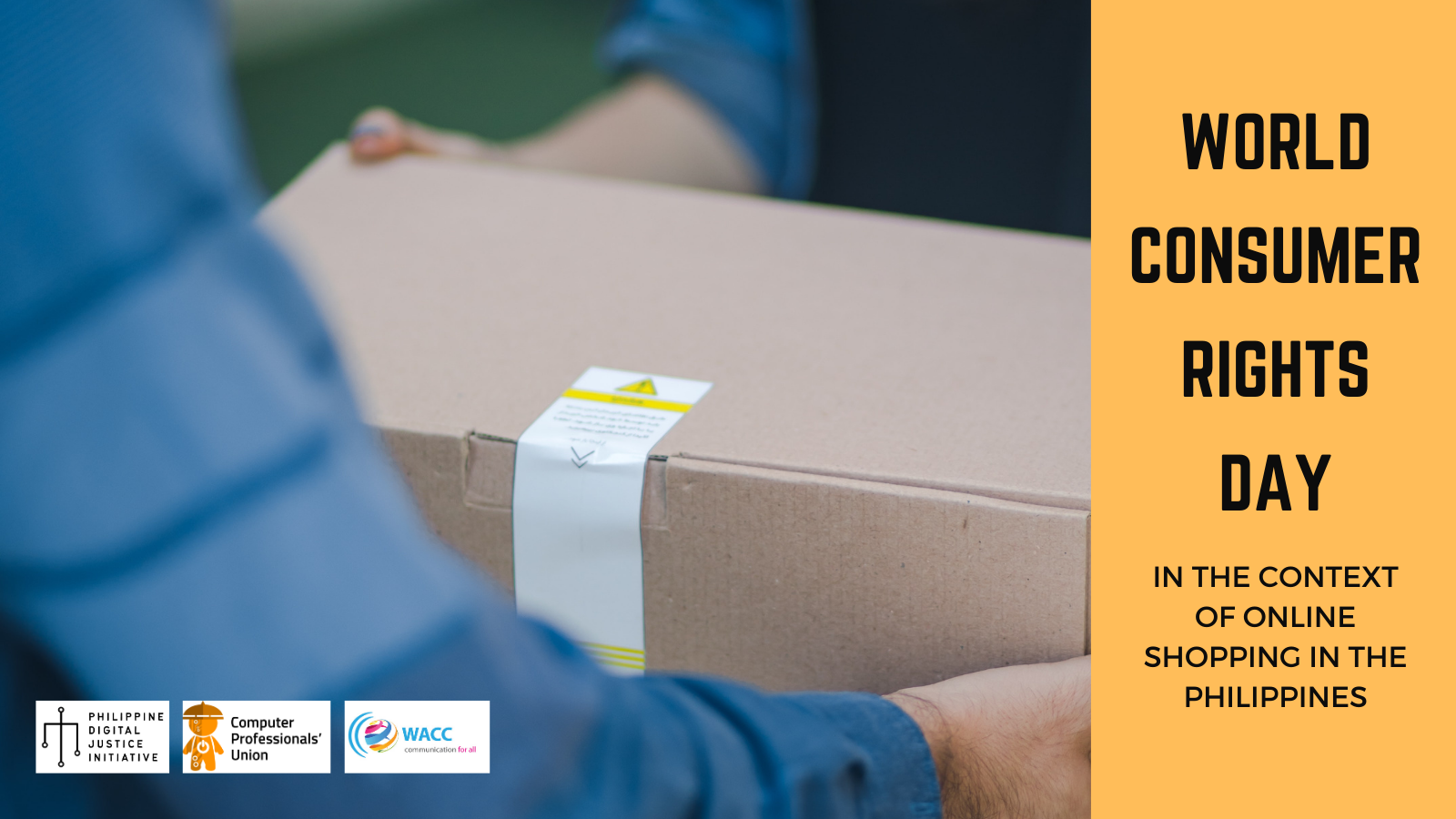March 15 marks the celebration for World Consumer Rights Day on which the rights of the consumers are starkly observed, upheld, and ensured in every part of the globe. As such, there is no better time to talk about than today the state of consumer rights of Filipinos on online shopping platforms—specifically Lazada and Shopee—amidst the ongoing digitalization of the economy and trade and the increasing reliance of Filipino consumers on e-commerce during the pandemic.
Using online shopping applications to buy and sell different goods has been popular among Filipino consumers since the early 2010s. But the mobility restrictions brought by the COVID-19 pandemic lockdown coupled with the increasing smartphone penetration in the Philippines caused a spike in the usage of Filipinos for online shopping applications as an alternative and more convenient shopping to the physical stores such as malls and groceries. The Philippines experienced a 53% increase in usage of shopping applications in the 2nd quarter of 2020, while the average basket size or spending increased up to 57%. But despite their continuous growth, the most popular online shopping platforms in the Philippines such as Shopee and Lazada had received a combined 13,674 complaints from their customers from January to September last year according to DTI; most of the complaints are related to “prices, defective products, and deceptive, unfair, or unconscionable sales acts or practices” [2]. A good example that has made rounds in social media is the student who received rocks instead of the laptop he ordered [3]. In such cases, what can the platform and the respective government agencies do to ensure that the rights of consumers are upheld at their best?
Fortunately, online shopping platforms have a specific set of safety net to protect their customers and ensure their consumer rights. To ensure that the complaints related to transactions can be resolved on a customer-business level at first, Lazada and Shopee have their return policy wherein customers have to follow a particular set of instructions—mostly including screenshots and/or pictures that are vital to the complaint [4][5]. Aside from that, online shopping platforms indicate the specifics of their privacy policy on what are their preemptive measures to ensure that the rights of the consumers will be prioritized. For example, Sections 4 and 13 of Shopee’s privacy policy, namely the Data Collection and Data Withdraw, Consent, Request, Access to or Information, ensures that indicate how and for what purpose the platform collects specific data from customers; and how the customers can take actions on their data on the website [6].
Legal frameworks related to prioritizing consumer rights in every digital or online transaction also exist. The three laws that can be used for complaints regarding consumer rights are the following: Cybercrime Act of 2012, Electronic Act of 2000, and the Consumer Act of the Philippines of 1992[6][7][8]. The Department of Trade and Industry (DTI) is the government agency that mainly handles the cases of e-commerce related complaints, specifically the Fair-Trade Enforcement Bureau (FTEB) which handles “import regulation, sales promotion, product standards monitoring, business licensing, enforcement, mediation, and adjudication as regard the Consumer Act Price Act, and Business Name Laws” [9]. As a further means to help consumers, DTI also provided several tips on how people can protect themselves while shopping online [10].
Although private entities and legal institutions already exist to ensure that consumer rights are prioritized in e-commerce buy and sell, several weak spots exist and can produce detrimental effects to consumers and the digital economy in general. For instance, the DTI FTEB requires people to present themselves in the office to file complain which is not only impractical in a general sense, but can also discourage people to file and proceed with the errors they see online, which may lead to the piling up of e-commerce malpractice online. Existing laws are also obsolete and inadequate for the current ecosystem of e-commerce in the Philippines and with other countries as well because although some of the sections are updated, there are particularities in online shopping that are not encapsulated on the entire framework. One of them is the extent of accountability of foreign businesses selling using the online shopping application in the Philippines. As of the writing, the HB 6122 or the Internet Transactions Act (authored by Cong. Wes Gatchalian) attempts to address this issue by establishing an E-Commerce Bureau to handle related issues and to prescribe a role of conduct for businesses engaged in e-commerce, may it be local or foreign [11]. Although this bill offers hope for securing consumer rights in online shopping, the part wherein the registration of foreign businesses seems to contain a loophole [12].
In short, new laws and other legal protection should be created to adapt to the fast-paced digitalization of the economy. The responsibility is not only on the part of the government but should also include an element of cooperation and coordination from the private sector, especially in terms of findings within their research team and feedbacks from customers. Resolution should not only be sourced from customers complaining to assigned government agencies, especially when the apparatus of the agency handling digital issues approach this issue in an antiquated manner. The resolution for this issue should be earnest, especially when the COVID-19 pandemic is still not being addressed and people are becoming more reliant on e-commerce transactions.
Sources: [1] https://iprice.sg/trends/insights/the-impacts-of-covid-19-on-e-commerce-in-southeast-asia-in-h1-2020/
[2] https://mb.com.ph/2020/10/12/shopee-lazada-got-most-online-complaints-dti/
[3] https://mb.com.ph/2020/10/03/student-receives-three-rocks-instead-of-a-laptop/
[4,5] https://shopee.ph/docs/3591
[6] https://www.sunstar.com.ph/article/1776481/Pampanga/Opinion/Lacson-Protection-of-online-consumers
[7] https://www.officialgazette.gov.ph/1992/04/13/republic-act-no-7394-s-1992/
[8] https://www.officialgazette.gov.ph/1992/04/13/republic-act-no-7394-s-1992/
[9] https://www.dti.gov.ph/konsyumer/consumer-education/
[10] https://www.dti.gov.ph/konsyumer/consumer-education/
[11] https://pia.gov.ph/news/articles/1044273
[12] https://www.lexology.com/library/detail.aspx?g=f6fc2b5c-6adb-4cc7-a00e-ee726ff9ee9c

